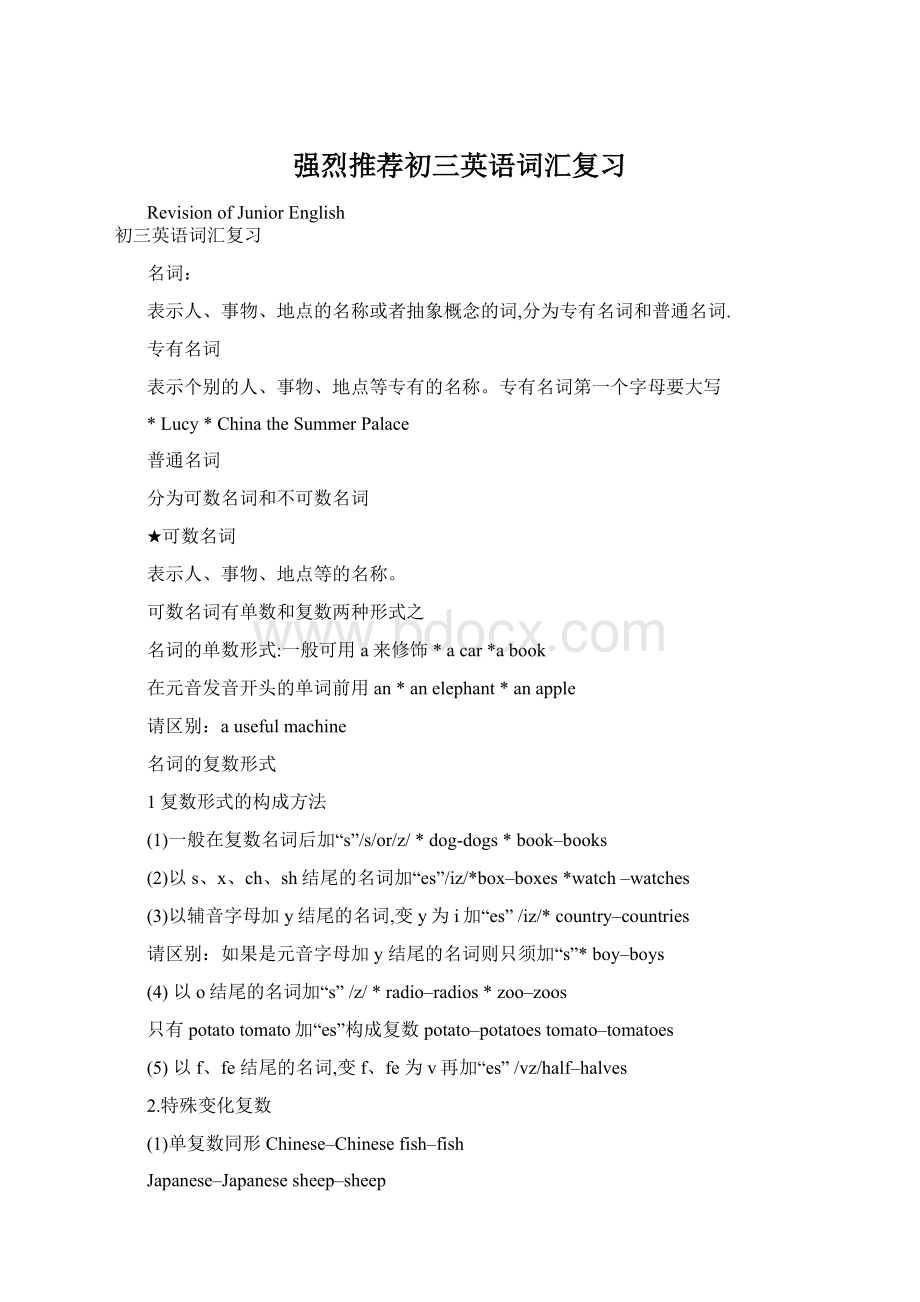强烈推荐初三英语词汇复习.docx
《强烈推荐初三英语词汇复习.docx》由会员分享,可在线阅读,更多相关《强烈推荐初三英语词汇复习.docx(21页珍藏版)》请在冰豆网上搜索。

强烈推荐初三英语词汇复习
RevisionofJuniorEnglish
初三英语词汇复习
名词:
表示人、事物、地点的名称或者抽象概念的词,分为专有名词和普通名词.
专有名词
表示个别的人、事物、地点等专有的名称。
专有名词第一个字母要大写
*Lucy*ChinatheSummerPalace
普通名词
分为可数名词和不可数名词
★可数名词
表示人、事物、地点等的名称。
可数名词有单数和复数两种形式之
名词的单数形式:
一般可用a来修饰*acar*abook
在元音发音开头的单词前用an*anelephant*anapple
请区别:
ausefulmachine
名词的复数形式
1复数形式的构成方法
(1)一般在复数名词后加“s”/s/or/z/*dog-dogs*book–books
(2)以s、x、ch、sh结尾的名词加“es”/iz/*box–boxes*watch–watches
(3)以辅音字母加y结尾的名词,变y为i加“es”/iz/*country–countries
请区别:
如果是元音字母加y结尾的名词则只须加“s”*boy–boys
(4)以o结尾的名词加“s”/z/*radio–radios*zoo–zoos
只有potatotomato加“es”构成复数potato–potatoestomato–tomatoes
(5)以f、fe结尾的名词,变f、fe为v再加“es”/vz/half–halves
2.特殊变化复数
(1)单复数同形Chinese–Chinesefish–fish
Japanese–Japanesesheep–sheep
(2)变元音字母oo为eetooth–teethfoot–feet
3.变man为men:
man–menwoman–womenpoliceman–policemen
请区别:
German(德国人)–Germans
4.其它形式child–childrenmouse–mice
5.一些合成名词的复数构成分两种情况
(1)将中心词变为复数:
girlfriend-girlfriends
(2)man,woman构成的合成词,每个名词都要变成复数
amandoctor–mendoctors
awomanteacher–womenteachers
6.常以复数形式出现的名词peopleclothespolicetrousers
这些名词作主语时,注意它们的谓语用复数
*Myclothesarenewerthanyours.Thepoliceoftencomehere
7.可用howmany,many,afew,few,any,lotsof,some,alotof等修饰可数名词复数
*Thereareafewpeopleinthepark.
*Howmanyknivesarethereinyourpencil-box?
★不可数名词
物质名词和抽象名词属于不可数名词如:
water,rice,fish,meat等。
特别记住:
workchalktimespacemusicmoneyweathercottonhomeworkwoodinformationnewsmedicine
1.不可数名词无复数,作主语时常看成单数
*Somebreadisoverthere.
*Nonewsisgoodnews.
2.常用howmuch,much,alittle,little,alotof,some,any等来修饰不可数名词
*Theyhadmuchmoney.
*Hedoeslittlehouseworkathome
3.常用apieceof,acupof,aglassof,abottleof等来表示不可数名词的量,单复数表现在of前面的名词上,而of后始终是单数
*Thereisapieceofpaperinthebook.
*Threeglassesoforangeareonthedesk.
注意:
可数名词也可用量来表示,of后用复数
*Therearetwobagsofclothesoverthere.
*Wehavefiveboxesofapples.
4.有些可数名词或不可数名词在一定情
况下可相互转化,同一个词,但意思不同
(1)glass(玻璃)–aglass(玻璃杯)room(空间)–aroom(房间)
paper(纸)–apaper(报纸)work(工作)–awork(著作)
(2)fruit(水果)–fruits(各种水果)fish(鱼)–fishes(各种鱼)
hair(所有头发)–hairs(几根头发)time(时间)–times(时代)
名词的一般用法
★名词做定语
1.修饰另一名词时,一般用单数
*Hehastwopencil-boxes.
*Therearethreebananatreesoverthere.
2.manwoman用做定语时,应与后面的名词保持数的一致
*Weneedamanteacher.
*Theyareallwomenworkers.
3.sports,clothes做定语时,仍用复数形式
*asportsfield*aclothesshop
4.当数词与单位名词一起做定语时,单位名词往往用单数形式,数词与单位名词用“-”连接。
*Heisafourteen-year-oldboy.
*Thisisatwo-hourplan.
★名词做主语时,应注意名词的数,避免主谓不一致。
Herfamilyisalargeoneandherfamilyareallteachers.
她家是一个大家庭,她的家人都是老师。
*Thereisapairofglassesonthedesk.
名词所有格
表示名词间的所有关系“…的”
一.名词所有格的构成方法
1.单数名词后加“’s”
*Tom’sbook*myfriend’suncle
2.以s结尾的复数名词,则在s后加“’”即可
*Teachers’Day*twoweeks’holiday
3.不以s结尾的复数名词的所有格,仍按惯例加“’s”
*Children’sDay*men’sshoes
4.用of加名词,构成所属关系的短语,主要用于表示无生命名词的所有关系
*thecolorofthewall
*apictureoftheclassroom
二.名词所有格的几个注意点
1.可用名词所有格表示地点,地点名词习惯上省略
*myaunt’s(home)(我姑姑家)
*gototheteachers’(office)(去老师办公室)
2.有些名词的所有格可用两种形式
*thecat’sname/thenameofthecat
*China’scapital/thecapitalofChina
3.表示两人共同拥有,在最后一个名词后加“’s”
*LucyandLily’sroom露西和莉莉的房间(两人共有一间房间)
请区别:
Lucy’sandLily’srooms露西的房间和莉莉的房间(两人各有一间房间)
5)有些不可数名词要表示“一种”、“一场”、“一堆”时,须加不定冠词
*aheavysnow*astrongwind*makeafire*haveagoodtime
6)用于固定词组
*halfanhour*amomentago*alotof*havearest*alittle
冠词:
虚词,本身无独立的意义,它用来帮助说明名词所指的人或物是泛指还是特指
不定冠词a,an(泛指)定冠词the(特指)
1.不定冠词的用法
1)表示某人(事物)的某一种类
*Myfatherisadriver.
*Doyoulikeanappleorapear?
2)表示某一事物中的任何一个
*Anelephantisbiggerthanahorse.
*Amonkeycanclimbtrees.
3)表示某人某物,但不具体说明何人何物。
*AstudentfromClassTworunsfastest.
*Amaniscallingnow.
4)表示数量,有“一”的含义
*Thereisaflowerinthevase.
*Apandahasamouth,anose,twoeyes.
5)有些不可数名词要表示“一种”、“一场”、“一堆”时,须加不定冠词
*aheavysnow*astrongwind*makeafire*haveagoodtime
6)用于固定词组
*halfanhour*amomentago*alotof*havearest*alittleafew
2.定冠词的用法
1)指上文提到过的人或物,用定冠词the
2)世界上独一无二的事物前用定冠词the
*thesun*themoon*theearth
3)定冠词the用于序数词前或表示方位的名词前和形容词最高级前
*thefirst*thebest*inthesouth
4)乐器名称前用定冠词the
*playthepiano*playtheviolin
5)在复数姓氏前加the,表示××一家人,常看成复数
*TheBrownsaregoingtoShanghaiforaholidaythissummer.
=TheBrownfamilyaregoingtoShanghaiforaholidaythissummer.
6)在一些形容词前,表示一类人
*therich富人*theold老人*thedeaf聋子
7)在一些专有名词和习惯用语中常用定冠词the
theGreatWall*bytheway*inthemorning*ontheright*behindthechair
3.不用冠词
1)在节日、星期、月份、季节、年、学科等词前不用冠词
*insummer*inAugust*onSunday*studyphysics
请区别:
inthespringof1945(特指,加the)
2)一日三餐和球类运动名词前不用冠词
*havebreakfast*playfootball
3)名词前已有this,that,my,your,some,any,each作定语,不用冠词
*Theymetherethismorning.
*Eachboyhasaworkbook.
4)一些专有名词、不可数名词、称呼、头衔不用冠词
China,GradeTwo,Mr.Li,Dr.,Liu,meat
5)表示颜色、语种、国家前不用冠词
*inpurple*inred*Japanese*Britain
6)固定词组
*gotobed*bybus*atnight*intime
4.在有些词组中,有冠词和无冠词意思不同
★infrontof在…前面
inthefrontof在…范围内的前部
*Thereisatreeinfrontofthehouse.房子前面有一棵树
*Theteachers’deskisinthefrontoftheclassroom.讲台在教室的前部
★inhospital(生病)住院
inthehospital医院里
*He’sillinhospital.他生病住院。
*Myparentsworkinthehospital.我的父母在医院工作。
Exercises
Ⅰ用名词的正确形式填空
1Hecuttheappleinto________(half).
2The________(potato)aremine.
3Howmany________(family)arethereinthistown?
4Thereareten________(deer)onthefarm.
5These________(German)are__________(businessman).
6Lastweekwewenttothe__________(child)Park.
Ⅱ改错
1.It’sahardwork.
2.Wedon’thaveanyclassonSundays.
3.Theroom’swindowsareverybig
4Howmanymilkisthereinthebag?
5.CouldIhavethreepapers,please?
6.Thesetwopiecesofbreadisoverthere
Ⅲ选择
1Ifound____goodnewsin____newspaper.
A.a,aB.apieceof,apieceofC.a,pieceofD.apieceof,a
2What____itistoday!
A.afineweatherB.fineweatherC.fineaweatherD.thefineweather
3Totheir_____,theyhaveallpassedtheexam.
A.surpriseB.surprisingC.surprisesD.surprised
4Lucyis____sister.
A.MaryandJackB.Mary’sandJack’sC.MaryandJacksD.MaryandJack’s
5Pleasemake____forhim.Heisverytired.
A.anyroomB.anyroomC.someroomsD.someroom
6Themodelplanewasmadebya____boy.
A.ten-years-oldB.ten-year-olderC.ten-year-oldD.ten-yearold
7Hewenttothe____tobuyapairofshoes.
AshoesstoreBshoestore
Cshoe’sstoreDshoes’store
8Iwillgiveyou____tofinishit.
Atwoweek’stimeBtwoweeks’timeCtwoweektimeDtwoweekstime
9Thetwobedroomarethe____.
AtwinsBtwin’sCtwins’Dtwins
10ThisisanoldphotoofminewhenI____.
AhaveshorthairsBhadshorthairsChaveshorthairDhadshorthair
11Ithinkthecountryismuchmorebeautifulthananyother____intheworld.
AcountryBcountriesCthecountryDthecountries
12John’sunclehasmanyfriends.Mr.Shuteisafriendof____.
AJohn’suncleBJohnuncle’sCJohn’suncle’sDJohnuncle
Ⅳ填上适当冠词
1Thereis________“m”in________word“mother”.
2Didyouplay________basketballorplay________pianoafter_______school?
3Turnrightat_______thirdcrossingon________left.
4Theygotto________moonby________spaceship.
5Sheis________universitystudent,shelikes________musicof________film.
6Wedidn'thave_______historyyesterday,wewenttovisit________HistoryMuseum.
7________Smithswentto________capitalof________Chinalastyear.
8What________windydayitis!
9His________bestfriendflewto________France________lastweek.
10________Chinesedoctortoldhimtotake_____threetimes______day
Pronouns
代词
代词的分类
人称代词PersonalPronouns
物主代词PossessivePronouns
反身代词SelfPronouns
不定代词IndefinitePronouns
指示代词DemonstrativePronouns
疑问代词InterrogativePronouns
人称代词PersonalPronouns
主格Iyouhesheitweyouthey
宾格meyouhimheritusyouthem
1.人称代词作主语时用主格,作宾语时用宾格
*Theyalllikehimverymuch.他们都很喜欢他。
*Shegavethebookstoyouandme.这些书是她送给你和我的。
2.人称代词在作表语时,用宾格
*Who’sknockingatthedoor?
–It’sme.谁敲门?
-是我。
3.人称代词在并列使用时的顺序为“第二人称,第三人称,第一人称”
*You,sheandIallenjoythemusic.你我她都喜欢音乐。
4.she可以用来代表国家、船只、大地、月亮等
*Weloveourmotherland,wehopeshe’llbestrongerandbigger.
我们热爱我们的祖国,我们希望她更强大。
*Theshipisleaving.She’sonherfirsttriptoBoston.
轮船要起航了。
这是她第一次去波士顿。
5.it作为人称代词时,可以表示天气、距离、时间、环境等
*What’theweatherliketoday?
–It’swindy.今天的天气怎么样?
-有风。
*It’saboutfiveminutes’walkfromhometoschool.
从家到学校的路程大约5分钟。
6.it可作为形式主语,将不定式、动名词等构成的主语后移,使句子显得平稳
*It’shardtoreachtheapples.很难够到苹果。
*It’sgoodforyoutakingawalkaftersupper.对你来说饭后散步是有好处
物主代词PossessivePronouns
形容词性,名词性
mymineyouryourshishisherhersitsitsouroursyouryourstheirtheirs
1.形容词性物主代词在句中只能作定语
*Mybrotherisaworker.我弟弟是个工人。
*Hisparentsareveryfriendly.他的父母非常友善。
2.名词性物主代词在句中可作表语、主语和宾语
*Whosedictionaryisthis?
–It’smine.这字典是谁的?
-我的。
*Ourroomisbigandtheirsissmall.我们的房间大,他们的房间小。
*Youmayusemypen.I’llusehers.你可以用我的笔,我用他的好了。
3.形容词性物主代词和名词性物主代词的关系:
形容词性物主代词+名词=名词性物主代词
注意:
名词性物主代词在句中所指代的关系是单数还是复数。
*Thesebooksaren'tours.Oursarenew.(ourbooks=ours)
*Thisisnotourroom.Oursisoverthere.(ourroom=ours)
4.“of+名词性物主代词”表示所属
*Asisterofhisisanurse.他的一个妹妹是个护士。
*Tomisafriendofmine我的一个朋友
反身代词SelfPronouns
单数myselfyourselfhimselfherselfitself
复数ourselvesyourselvesthemselves
1.反身代词在句中可以作宾语、表语和同位语
*Hethinksmoreofothersthanofhimself.他想到别人比想到自己更多一些。
*Thatpoorboywasmyself.那个可怜的孩子就是我自己。
*Hehimselfwasadoctor.他本人就是一个大夫。
*Imyselfcanworktheproblemout.我能亲自算出这道题
2.反身代词有以下常见搭配
enjoyoneself=haveagoodtime
b